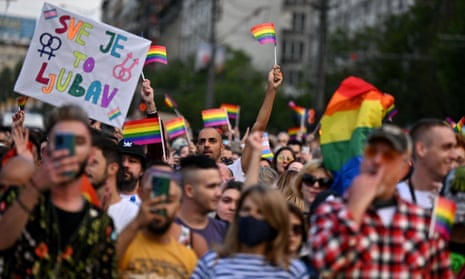Serbia will not allow a pan-European LGBTQ+ Pride event to take place in Belgrade next month, the president has said, citing threats from rightwing extremists and fears of clashes.
The Serbian president, Aleksandar Vučić, announced the decision to cancel the EuroPride celebration on 12-18 September during a news conference where he also proposed extending the term of Serbia’s prime minister, who identifies as a lesbian.
Members of the European Pride Organisers Association (EPOA) chose Serbia’s capital three years ago to host the annual event. Vučić said a crisis with neighbouring Kosovo and various economic problems were among the reasons why the Balkan country’s authorities did not think they could handle EuroPride, which features a Pride parade.
“This is a violation of minority rights, but at this moment the state is pressured by numerous problems,” he said.
EuroPride organisers said Serbian authorities must provide security against “bullies” who threaten the march and seek to discredit it. The EPOA’s president, Kristīne Garina, urged the Serbian prime minister, Ana Brnabić, to honour a promise to support the event.
“President Vučić cannot cancel someone else’s event,” Garina said. “The right to hold Pride has been ruled by the European court of human rights to be a fundamental human right.”
An organiser in Serbia, Goran Miletić, said police must formally ban the march to prevent it from happening. If they issue a ban, organisers would file a complaint at Serbia’s constitutional court. He insisted that indoor events planned as part of the week-long celebration cannot be banned.
“The only thing that can happen is for the police to ban the [Pride] march,” Miletić said. “However, such a hypothetical decision would be contrary to the constitution.”
Serbia pledged to protect LGBTQ+ rights as it seeks EU membership, while increasingly vocal rightwing supporters have harassed and sometimes attacked people based on their sexual orientation or gender identity.
Serbia’s rightwing and pro-Russia groups have gained strength and some secured parliament seats during the country’s April general election. Several thousand people recently joined a march in Belgrade against LGBTQ+ Pride.
“It’s not the question of whether they [extremists] are stronger, but you just can’t do it all at the same moment, and that’s it,” Vučić said. “I am not happy about it, but we can’t manage.”
Vučić won another five-year term in the first round of April’s vote, and his Serbian Progressive party won the general election in a landslide. The president said on Saturday that Brnabić, who has led the country’s previous two governments, should head the new cabinet that is expected to be formed in the coming weeks.
Brnabić first became Serbia’s prime minister in 2017, in what was seen as major change for a country that is predominantly conservative and male-dominated. Brnabić lives with her female partner, but LGBTQ+ groups have criticised the prime minister, saying she has done little to improve the position of lesbian, gay, bisexual, transgender and queer individuals in Serbian society.
After clashes at Belgrade’s 2010 Pride march, subsequent marches took place with strong police protection.
after newsletter promotion
EuroPride was first celebrated in London in 1992, and Belgrade was due to be the first city in south-east Europe to host the event, according to organisers. Next month’s event was expected to attract thousands of people from across Europe.
Vučić said the celebration could be postponed to “happier times”. He insisted that state authorities must plan instead for energy problems anticipated for the winter, partly as a result of Russia’s war in Ukraine.
The Serbian government has condemned the Russian invasion but has refused to join western sanctions against Russia.
Vučić said tensions with Kosovo, a former Serbian province whose independence the government in Belgrade has refused to recognise, were another source of pressure on authorities.
Tensions rose last month with a dispute over travel documents and licence plates, and have heightened concerns about instability in the Balkans, where multiple wars were fought amid the breakup of Yugoslavia. Serbia relies on support from Russia and China to continue claiming that Kosovo is part of its territory.
Washington and most EU countries have recognised Kosovo’s independence. US and EU envoys visited Kosovo and Serbia earlier this week in an effort to ease the tensions.
